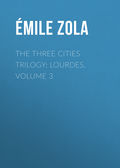
Эмиль Золя
Abbe Mouret's Transgression
VI
The road wound on between fallen rocks, among which the peasants had succeeded here and there in reclaiming six or seven yards of chalky soil, planted with old olive trees. Under the priest’s feet the dust in the deep ruts crackled lightly like snow. At times, as he felt a warmer puff upon his face, he would raise his eyes from his book, as if to seek whence came this soft caress; but his gaze was vacant, straying without perception over the glowing horizon, over the twisted outlines of that passion-breathing landscape as it stretched out in the sun before him, dry, barren, despairing of the fertilisation for which it longed. And he would lower his hat over his forehead to protect himself against the warm breeze and tranquilly resume his reading, his cassock raising behind him a cloudlet of dust which rolled along the surface of the road.
‘Good morning, Monsieur le Cure,’ a passing peasant said to him.
Sounds of digging alongside the cultivated strips of ground again roused him from his abstraction. He turned his head and perceived big knotty-limbed old men greeting him from among the vines. The Artauds were eagerly satisfying their passion for the soil, in the sun’s full blaze. Sweating brows appeared from behind the bushes, heaving chests were slowly raised, the whole scene was one of ardent fructification, through which he moved with the calm step born of ignorance. No discomfort came to him from the great travail of love that permeated that splendid morning.
‘Steady! Voriau, you mustn’t eat people!’ some one gaily shouted in a powerful voice by way of silencing the dog’s loud barks.
Abbe Mouret looked up.
‘Oh! it’s you. Fortune?’ he said, approaching the edge of the field in which the young peasant was at work. ‘I was just on my way to speak to you.’
Fortune was of the same age as the priest: a bigly built, bold-looking young fellow, with skin already hardened. He was clearing a small plot of stony heath.
‘What about, Monsieur le Cure?’ he asked.
‘About Rosalie and you,’ replied the priest.
Fortune began to laugh. Perhaps he thought it droll that a priest should interest himself in such a matter.
‘Well,’ he muttered, ‘I’m not to blame in it nor she either. So much the worse if old Bambousse refuses to let me have her. You saw yourself how his dog was trying to bite me just now; he sets him on me.’
Then, as Abbe Mouret was about to continue, old Artaud, called Brichet, whom he had not previously perceived, emerged from the shadow of a bush behind which he and his wife were eating. He was a little man, withered by age, with a cringing face.
‘Your reverence must have been told a pack of lies,’ he exclaimed. ‘The youngster is quite ready to marry Rosalie. What’s happened isn’t anybody’s fault. It has happened to others who got on all right just the same. The matter doesn’t rest with us. You ought to speak to Bambousse. He’s the one who looks down on us because he’s got money.’
‘Yes, we are very poor,’ whined his wife, a tall lachrymose woman, who also rose to her feet. ‘We’ve only this scrap of ground where the very devil seems to have been hailing stones. Not a bite of bread from it, even. Without you, your reverence, life would be impossible.’
Brichet’s wife was the one solitary devotee of the village. Whenever she had been to communion, she would hang about the parsonage, well knowing that La Teuse always kept a couple of loaves for her from her last baking. At times she was even able to carry off a rabbit or a fowl given her by Desiree.
‘There’s no end to the scandals,’ continued the priest. ‘The marriage must take place without delay.’
‘Oh! at once! as soon as the others are agreeable,’ said the old woman, alarmed about her periodical presents. ‘What do you say, Brichet? we are not such bad Christians as to go against his reverence?’
Fortune sniggered.
‘Oh, I’m quite ready,’ he said, ‘and so is Rosalie. I saw her yesterday at the back of the mill. We haven’t quarrelled. We stopped there to have a bit of a laugh.’
But Abbe Mouret interrupted him: ‘Very well, I am now going to speak to Bambousse. He is over there, at Les Olivettes, I believe.’
The priest was going off when the mother asked him what had become of her younger son Vincent, who had left in the early morning to serve mass. There was a lad now who badly needed his reverence’s admonitions. And she walked by the priest’s side for another hundred yards, bemoaning her poverty, the failure of the potato crop, the frost which had nipped the olive trees, the hot weather which threatened to scorch up the scanty corn. Then, as she left him, she solemnly declared that her son Fortune always said his prayers, both morning and evening.
Voriau now ran on in front, and suddenly, at a turn in the road, he bolted across the fields. The priest then struck into a small path leading up a low hill. He was now at Les Olivettes, the most fertile spot in the neighbourhood, where the mayor of the commune, Artaud, otherwise Bambousse, owned several fields of corn, olive plantations, and vines. The dog was now romping round the skirts of a tall brunette, who burst into a loud laugh as she caught sight of the priest.
‘Is your father here, Rosalie?’ the latter asked.
‘Yes, just across there,’ she said, pointing with her hand and still smiling.
Leaving the part of the field she had been weeding, she walked on before him with the vigorous springiness of a hard-working woman, her head unshielded from the sun, her neck all sunburnt, her hair black and coarse like a horse’s mane. Her green-stained hands exhaled the odour of the weeds she had been pulling up.
‘Father,’ she called out, ‘here’s Monsieur le Cure asking for you.’
And there she remained, bold, unblushing, with a sly smile still hovering over her features. Bambousse, a stout, sweating, round-faced man, left his work and gaily came towards the priest.
‘I’d take my oath you are going to speak to me about the repairs of the church,’ he exclaimed, as he clapped his earthy hands. ‘Well, then, Monsieur le Cure, I can only say no, it’s impossible. The commune hasn’t got the coin. If the Lord provides plaster and tiles, we’ll provide the workmen.’
At this jest of his the unbelieving peasant burst into a loud guffaw, slapped his thighs, coughed, and almost choked himself.
‘It was not for the church I came,’ replied the Abbe Mouret. ‘I wanted to speak to you about your daughter Rosalie.’
‘Rosalie? What has she done to you, then?’ inquired Bambousse, his eyes blinking.
The girl was boldly staring at the young priest, scrutinising his white hands and slender, feminine neck, as if trying to make him redden. He, however, bluntly and with unruffled countenance, as if speaking of something quite indifferent, continued:
‘You know what I mean, Bambousse. She must get married.’
‘Oh, that’s it, is it?’ muttered the old man, with a bantering look. ‘Many thanks for the message. The Brichets sent you, didn’t they? Mother Brichet goes to mass, and so you give her a helping hand to marry her son – it’s all very fine. But, I’ve got nothing to do with that. It doesn’t suit me. That’s all.’
Thereupon the astonished priest represented to him that the scandal must be stopped, and that he ought to forgive Fortune, as the latter was willing to make reparation for his transgression, and that, lastly, his daughter’s reputation demanded a speedy marriage.
‘Ta, ta, ta,’ replied Bambousse, what a lot of words! I shall keep my daughter, please understand it. All that’s got nothing to do with me. That Fortune is a beggarly pauper, without a brass farthing. What an easy job, if one could marry a girl like that! At that rate we should have all the young things marrying off morning and night. Thank Heaven! I’m not worried about Rosalie: everybody knows what has happened; but it makes no difference. She can marry any one she chooses in the neighbourhood.’
‘But the child?’ interrupted the priest.
‘The child indeed! There’ll be time enough to think of that when it’s born.’
Rosalie, perceiving the turn the priest’s application was taking, now thought it proper to ram her fists into her eyes and whimper. And she even let herself fall upon the ground.
‘Shut up, will you, you hussy!’ howled her father in a rage. And he proceeded to revile her in the coarsest terms, which made her laugh silently behind her clenched fists.
‘You won’t shut up? won’t you? Just wait a minute then, you jade!’ continued old Bambousse. And thereupon he picked up a clod of earth and flung it at her. It burst upon her knot of hair, crumbling down her neck and smothering her in dust. Dizzy from the blow, she bounded to her feet and fled, sheltering her head between her hands. But Bambousse had time to fling two more clods at her, and if the first only grazed her left shoulder, the next caught her full on the base of the spine, with such force that she fell upon her knees.
‘Bambousse!’ cried the priest, as he wrenched from the peasant’s hand a number of stones which he had just picked up.
‘Let be, Monsieur le Cure,’ said the other. ‘It was only soft earth. I ought to have thrown these stones at her. It’s easy to see that you don’t know girls. Hard as nails, all of them. I might duck that one in the well, I might break all her bones with a cudgel, and she’d still be just the same. But I’ve got my eye on her, and if I catch her!.. Ah! well, they are all like that.’
He was already comforted. He took a good pull at a big flat bottle of wine, encased in wicker-work, which lay warming on the hot ground. And breaking once more into a laugh, he said: ‘If I only had a glass, Monsieur le Cure, I would offer you some with pleasure.’
‘So then,’ again asked the priest, ‘this marriage?’
‘No, it can’t be; I should get laughed at. Rosalie is a stout wench. She’s worth a man to me. I shall have to hire a lad the day she goes off… We can have another talk about it after the vintage. Besides, I don’t want to be robbed. Give and take, say I. That’s fair. What do you think?’
Nevertheless for another long half-hour did the priest remain there preaching to Bambousse, speaking to him of God, and plying him with all the reasons suited to the circumstances. But the old man had resumed his work; he shrugged his shoulders, jested, and grew more and more obstinate. At last, he broke out: ‘But if you asked me for a sack of corn, you would give me money, wouldn’t you? So why do you want me to let my daughter go for nothing?’
Much discomfited, Abbe Mouret left him. As he went down the path he saw Rosalie rolling about under an olive tree with Voriau, who was licking her face. With her arms whirling, she kept on repeating: ‘You tickle me, you big stupid. Leave off!’
When she perceived the priest, she made an attempt at a blush, settled her clothes, and once more raised her fists to her eyes. He, on his part, sought to console her by promising to attempt some fresh efforts with her father, adding that, in the meantime, she should do nothing to aggravate her sin. And then, as she impudently smiled at him, he pictured hell, where wicked women burn in torment. And afterwards he left her, his duty done, his soul once more full of the serenity which enabled him to pass undisturbed athwart the corruptions of the world.
VII
The morning was becoming terribly hot. In that huge rocky amphitheatre the sun kindled a furnace-like glare from the moment when the first fine weather began. By the planet’s height in the sky Abbe Mouret now perceived that he had only just time to return home if he wished to get there by eleven o’clock and escape a scolding from La Teuse. Having finished reading his breviary and made his application to Bambousse, he swiftly retraced his steps, gazing as he went at his church, now a grey spot in the distance, and at the black rigid silhouette which the big cypress-tree, the Solitaire, set against the blue sky. Amidst the drowsiness fostered by the heat, he thought of how richly that evening he might decorate the Lady chapel for the devotions of the month of Mary. Before him the road offered a carpet of dust, soft to the tread and of dazzling whiteness.
At the Croix-Verte, as the Abbe was about to cross the highway leading from Plassans to La Palud, a gig coming down the hill compelled him to step behind a heap of stones. Then, as he crossed the open space, a voice called to him: ‘Hallo, Serge, my boy!’
The gig had pulled up and from it a man leant over. The priest recognised him – he was an uncle of his, Doctor Pascal Rougon, or Monsieur Pascal, as the poor folk of Plassans, whom he attended for nothing, briefly styled him. Although barely over fifty, he was already snowy white, with a big beard and abundant hair, amidst which his handsome regular features took an expression of shrewdness and benevolence.3
‘So you potter about in the dust at this hour of the day?’ he said gaily, as he stooped to grasp the Abbe’s hands. ‘You’re not afraid of sunstroke?’
‘No more than you are, uncle,’ answered the priest, laughing.
‘Oh, I have the hood of my trap to shield me. Besides, sick folks won’t wait. People die at all times, my boy.’ And he went on to relate that he was now on his way to old Jeanbernat, the steward of the Paradou, who had had an apoplectic stroke the night before. A neighbour, a peasant on his way to Plassans market, had summoned him.
‘He must be dead by this time,’ the doctor continued. ‘However, we must make sure… Those old demons are jolly tough, you know.’
He was already raising his whip, when Abbe Mouret stopped him.
‘Stay! what o’clock do you make it, uncle?’
‘A quarter to eleven.’
The Abbe hesitated; he already seemed to hear La Teuse’s terrible voice bawling in his ears that his luncheon was getting cold. But he plucked up courage and added swiftly: ‘I’ll go with you, uncle. The unhappy man may wish to reconcile himself to God in his last hour.’
Doctor Pascal could not restrain a laugh.
‘What, Jeanbernat!’ he said; ‘ah, well! if ever you convert him! Never mind, come all the same. The sight of you is enough to cure him.’
The priest got in. The doctor, apparently regretting his jest, displayed an affectionate warmth of manner, whilst from time to time clucking his tongue by way of encouraging his horse. And out of the corner of his eye he inquisitively observed his nephew with the keenness of a scientist bent on taking notes. In short kindly sentences he inquired about his life, his habits, and the peaceful happiness he enjoyed at Les Artaud. And at each satisfactory reply he murmured, as if to himself in a tone of reassurance: ‘Come, so much the better; that’s just as it should be!’
He displayed peculiar anxiety about the young priest’s state of health. And Serge, greatly surprised, assured him that he was in splendid trim, and had neither fits of giddiness or of nausea, nor headaches whatsoever.
‘Capital, capital,’ reiterated his uncle Pascal. ‘In spring, you see, the blood is active. But you are sound enough. By-the-bye, I saw your brother Octave at Marseilles last month. He is off to Paris, where he will get a fine berth in a high-class business. The young beggar, a nice life he leads.’
‘What life?’ innocently inquired the priest.
To avoid replying the doctor chirruped to his horse, and then went on: ‘Briefly, everybody is well – your aunt Felicite, your uncle Rougon, and the others. Still, that does not hinder our needing your prayers. You are the saint of the family, my lad; I rely upon you to save the whole lot.’
He laughed, but in such a friendly, good-humoured way that Serge himself began to indulge in jocularity.
‘You see,’ continued Pascal, ‘there are some among the lot whom it won’t be easy to lead to Paradise. Some nice confessions you’d hear if all came in turn. For my part, I can do without their confessions; I watch them from a distance; I have got their records at home among my botanical specimens and medical notes. Some day I shall be able to draw up a wondrously interesting diagram. We shall see; we shall see!’
He was forgetting himself, carried away by his enthusiasm for science. A glance at his nephew’s cassock pulled him up short.
‘As for you, you’re a parson,’ he muttered; ‘you did well; a parson’s a very happy man. The calling absorbs you, eh? And so you’ve taken to the good path. Well! you would never have been satisfied otherwise. Your relatives, starting like you, have done a deal of evil, and still they are unsatisfied. It’s all logically perfect, my lad. A priest completes the family. Besides, it was inevitable. Our blood was bound to run to that. So much the better for you; you have had the most luck.’ Correcting himself, however, with a strange smile, he added: ‘No, it’s your sister Desiree who has had the best luck of all.’
He whistled, whipped up his horse, and changed the conversation. The gig, after climbing a somewhat steep slope, was threading its way through desolate ravines; at last it reached a tableland, where the hollow road skirted an interminable and lofty wall. Les Artaud had disappeared; they found themselves in the heart of a desert.
‘We are getting near, are we not?’ asked the priest.
‘This is the Paradou,’ replied the doctor, pointing to the wall. ‘Haven’t you been this way before, then? We are not three miles from Les Artaud. A splendid property it must have been, this Paradou. The park wall this side alone is quite a mile and a half long. But for over a hundred years it’s all been running wild.’
‘There are some fine trees,’ observed the Abbe, as he looked up in astonishment at the luxuriant mass of foliage which jutted over.
‘Yes, that part is very fertile. In fact, the park is a regular forest amidst the bare rocks which surround it. The Mascle, too, rises there; I have heard four or five springs mentioned, I fancy.’
In short sentences, interspersed with irrelevant digressions, he then related the story of the Paradou, according to the current legend of the countryside. In the time of Louis XV., a great lord had erected a magnificent palace there, with vast gardens, fountains, trickling streams, and statues – a miniature Versailles hidden away among the stones, under the full blaze of the southern sun. But he had there spent but one season with a lady of bewitching beauty, who doubtless died there, as none had ever seen her leave. Next year the mansion was destroyed by fire, the park doors were nailed up, the very loopholes of the walls were filled with mould; and thus, since that remote time, not a glance had penetrated that vast enclosure which covered the whole of one of the plateaux of the Garrigue hills.
‘There can be no lack of nettles there,’ laughingly said Abbe Mouret. ‘Don’t you find that the whole wall reeks of damp, uncle?’
A pause followed, and he asked:
‘And whom does the Paradou belong to now?’
‘Why, nobody knows,’ the doctor answered. ‘The owner did come here once, some twenty years ago. But he was so scared by the sight of this adders’ nest that he has never turned up since. The real master is the caretaker, that old oddity, Jeanbernat, who has managed to find quarters in a lodge where the stones still hang together. There it is, see – that grey building yonder, with its windows all smothered in ivy.’
The gig passed by a lordly iron gate, ruddy with rust, and lined inside with a layer of boards. The wide dry throats were black with brambles. A hundred yards further on was the lodge inhabited by Jeanbernat. It stood within the park, which it overlooked. But the old keeper had apparently blocked up that side of his dwelling, and had cleared a little garden by the road. And there he lived, facing southwards, with his back turned upon the Paradou, as if unaware of the immensity of verdure that stretched away behind him.
The young priest jumped down, looking inquisitively around him and questioning the doctor, who was hurriedly fastening the horse to a ring fixed in the wall.
‘And the old man lives all alone in this out-of-the-way hole?’ he asked.
‘Yes, quite alone,’ replied his uncle, adding, however, the next minute: ‘Well, he has with him a niece whom he had to take in, a queer girl, a regular savage. But we must make haste. The whole place looks death-like.’







